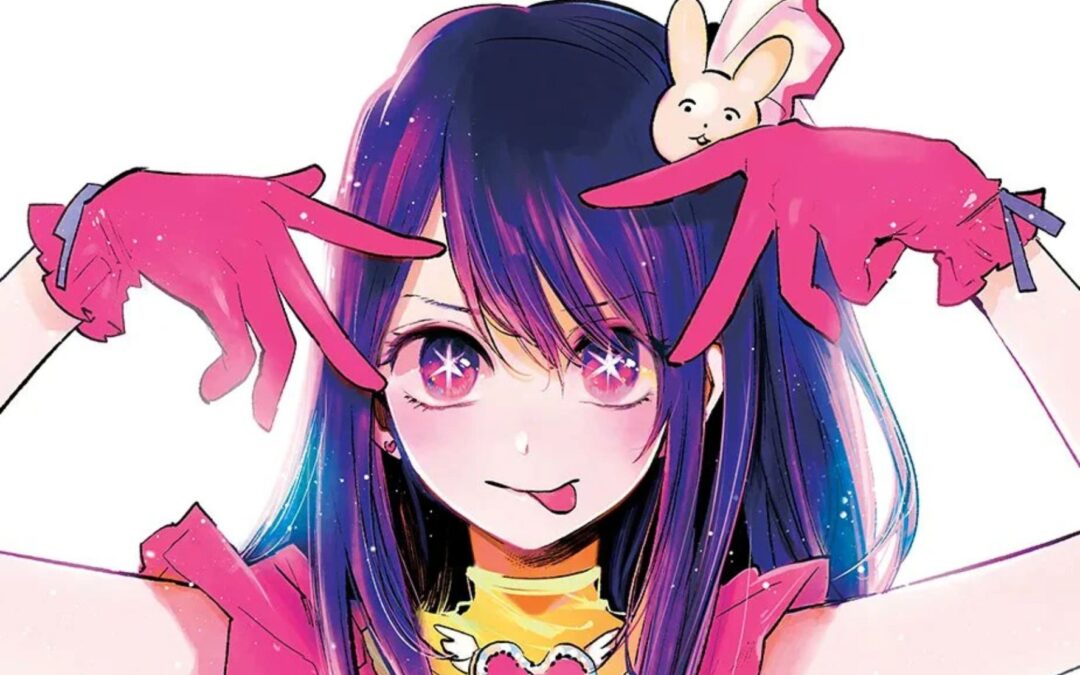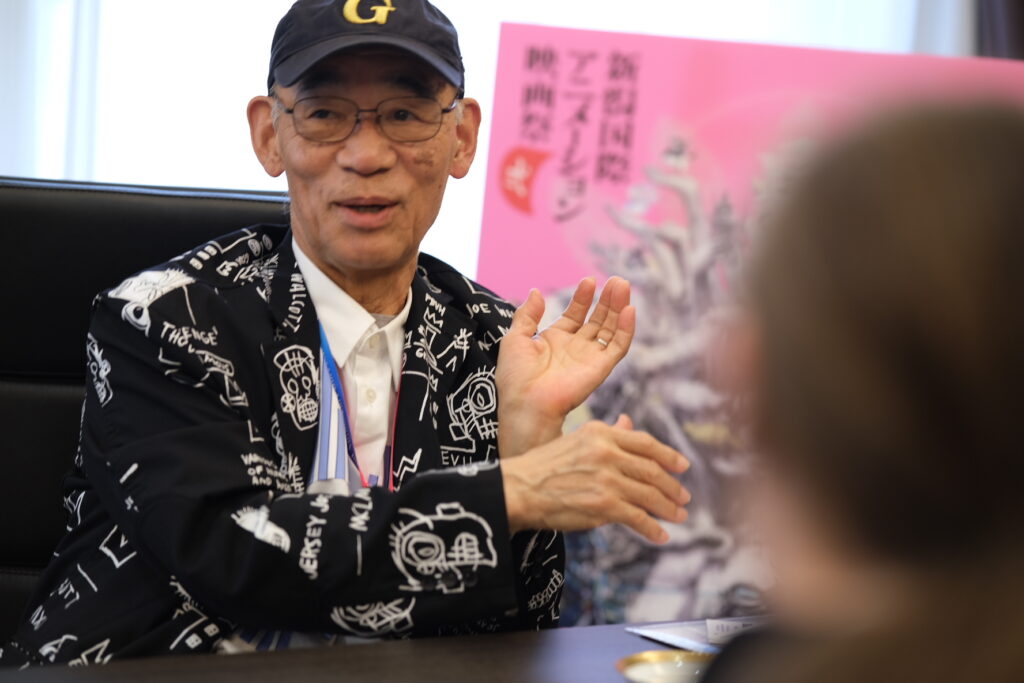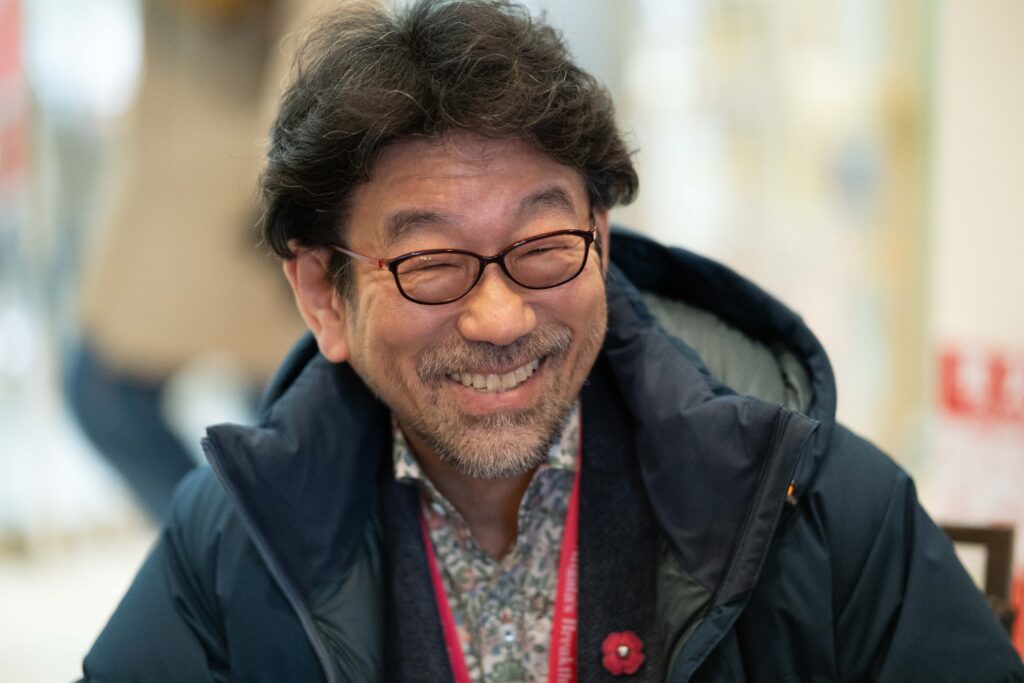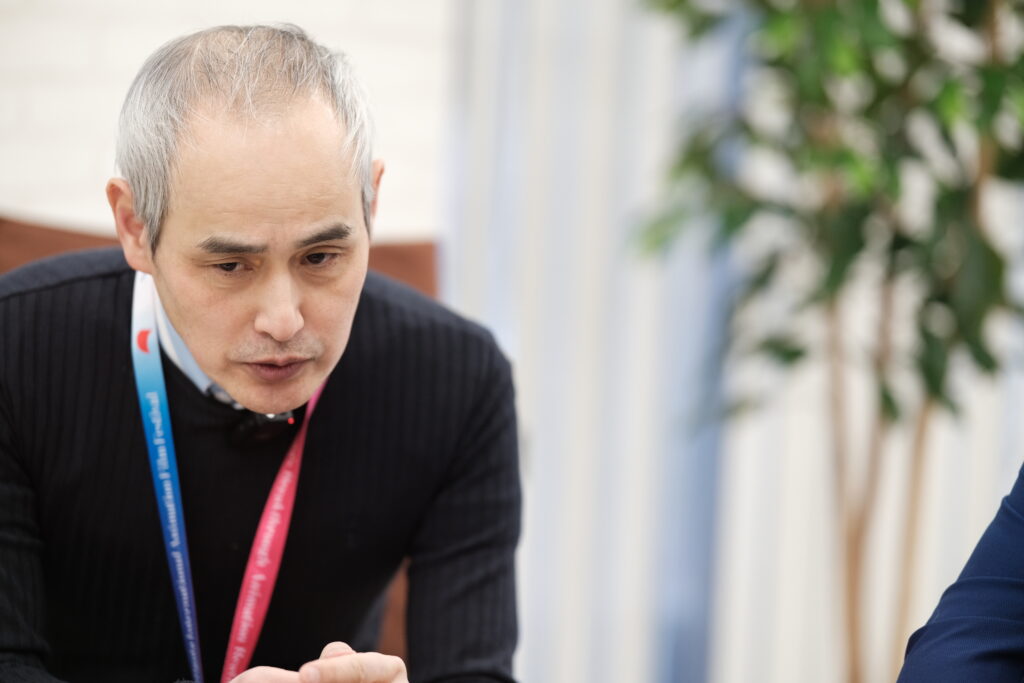The Oshi no Ko manga, which recently ended its publication, was created through the association of two successful authors, Aka Akasaka, mangaka of the hit love comedy Kaguya-sama: Love Is War, and Mengo Yokoyari, creator of Scum’s Wish.
During their visit at the 2024 edition of Manga Barcelona, we had the opportunity to sit down with them for a short interview and discuss their creative process.
This article would not have been possible without the help of our patrons!
If you like what you read, please support us on Ko-Fi! Get extra perks by subscribing to a monthly membership!
So, to kick things off, I’d like to hear about how you first met.
Aka Akasaka: Oh, I’ll answer then! After reading the first chapter of Mengo’s Scum’s Wish, I was chatting with a friend of mine, telling him how great of a start I found it to be, and he replied something like, “That’s my friend’s manga, you know!”. So this person introduced us, and Mengo and I started eating together, talking at mangaka parties… She left quite a strong impression on me. When I said I wanted to do something showbusiness-themed, I actually kind of had her art in mind. Her manga Kawaii was something of the like.
Mengo Yokoyari: It was a one-shot about show business with a pretty dark atmosphere.
Aka Akasaka: Yeah, it was really close to my own tastes in this matter. In the moments characters come crashing into each other, you can tell, “Ah, that’s Mengo!” (laughs)
You both usually draw and write the story in your respective works, so how did you divide the work this time? Like, who was drawing the nemu [storyboards]?
Mengo Yokoyari: Basically, Aka was doing all the nemu, and I drew the actual manga. At times we’d talk a bit, and I’d make small changes to the nemu, but other than that, there was a clear separation of the tasks.
Aka Akasaka: Sometimes, though, I’d just hand Mengo some white pages and leave everything to her! (laughs)
Mengo Yokoyari: So annoying! (laughs) Yeah, I was often free on the live scenes and such, so I did my best!
And how did your editor fit into this process?
Mengo Yokoyari: Oh, Mr. Sakai ?
Aka Akasaka: He mostly managed the schedule and pointed out inconsistencies in the setting. He did a great deal of work making the production easier for us, that was a huge help.
So, he wasn’t a direct part of the creative process? Like, you didn’t talk with him about the story beforehand?
Aka Akasaka: No, we didn’t. He knew all about the project. Everything Mengo knew, he knew as well. So he was never out of the loop, but he’s the type to think creative work is for the creators, so he left it to us.
Mengo Yokoyari: We prefer to work like this anyway.
Aka Akasaka: I know some editors want to be involved in the creative process itself, but they don’t really fit us.
Mengo Yokoyari: We want to do it by ourselves.
Mr. Akasaka said in an interview that “creating together” and the notions of “communication” and “miscommunication” were essential themes in Oshi no Ko. Is it something Ms. Yokoyari values as well?
Mengo Yokoyari: Definitely. For me, manga itself IS communication! At the most basic level, it’s always about friction between people… I think creation can only exist inside these sorts of things. That’s something I’m constantly thinking about, so I really do believe it’s a wonderful theme.
Aka Akasaka: Whenever I had trouble expressing something in the right way, Mengo-sensei would always give me some instructions or advice on how to convey my intentions properly. Because, as an author, she cares this much about communication.
It’s safe to say that “communication” or “miscommunication” is one of the most challenging areas of modern society, right? Whether in Japan or anywhere else.
Aka Akasaka: It is. Many people are brushing past each other, hurting each other even though they’re actually saying the same thing. Lately, in Japan, you hear the English word “care” a lot, too…
You have a lot of situations like… well, let’s take a work that’s being overpraised a bit. You’d automatically have people who’d take it upon themselves to “restore the balance” by overly criticizing it, like it’s the worst of the worst, 1-star worth type of thing, you know? Even though they really feel it’s 3 or 4-stars worth. I don’t think speaking with this sort of edge that goes beyond what you’re actually thinking amounts to much.
I’d like the people on the receiving end of a work to be more aware of this. I think if more people noticed this phenomenon, fewer would get hurt by it.
Social media play a major role in this, don’t they? They come up a lot in Oshi no Ko, but does their representation reflect your own experience?
Both: Well… It’s not completely unrelated, right? (laughs)
Aka Akasaka: Performers, entertainers and such are very exposed to the eyes of the public, so they’re often subject to slander. That’s something I can relate to myself, which made it a bit easier to write about.
Did you also talk with people from the industry?
Akasaka & Yokoyari: Oh yeah, a lot!
Aka Akasaka: And journalists, too.
I personally find Oshi no Ko‘s characters especially appealing, but when you two conceived the manga, what came out first? Was it the characters or the story?
Mengo Yokoyari: Well, Aka-sensei values characters a lot, but I think he’s the type to start by the plot, right?
Aka Akasaka: Definitely. Once I’m set on the story, I know what kind of cast I need. For example, let’s say I want to write a detective story. Naturally, I’ll need to cast a criminal, a victim, a detective, etc. The same goes for Oshi no Ko. With this sort of story, I knew I’d need my main characters, someone for the part of Ai, a manager, and so on. Once that’s decided, I can think about what kind of character would best fit each role in this story.
Mengo Yokoyari: As for me, I’m more character-focused, so when I’m writing a story, I tend to start with the characters, or rather, they form in my mind very naturally. So this time, I put a lot of effort into creating characters on top of the stage set by Aka. All I had to do was add some color to each role, and that’s all I focused on. As a result, I think I was able to create strong characters.
Aka Akasaka: I think you really did!
You know, when I was working on Kaguya-Sama: Love Is War, I started to feel like I was raising my characters. Like, I’ve heard many people say they loved everybody in Kaguya-sama, and I think that’s because they were seeing these characters just kind of sit together and talk, chapter after chapter. Progressively, you grow attached to everybody, right? But it’s not like I was aiming to make incredible characters from the very beginning; that’s not really how I work.
So, has that been your process for your other respective works as well?
Akasaka & Yokoyari: Absolutely.
Mengo Yokoyari: With characters who gradually become great people, winning the readers’ hearts is a bit easier. But we really had to give it our all with Ai Hoshino since she’s sort of amazing down from the very start.
All our thanks go to Mr. Aksaka and Ms. Yokoyari for their time, as well as the team of Manga Barcelona for setting up this interview.
Interview by Lilo Chiche & Dimitri Seraki
Translation by Florian Abbas & Lilo Chiche
Image credit: ©︎赤坂アカ×横槍メンゴ/集英社
Like our content? Feel free to support us on Ko-Fi!
You might also be interested in
Ideon is the Ego’s death – Yoshiyuki Tomino Interview [Niigata International Animation Film Festival 2024]
Yoshiyuki Tomino is, without any doubt, one of the most famous and important directors in anime history. Not just one of the creators of Gundam, he is an incredibly prolific creator whose work impacted both robot anime and science-fiction in general. It was during...
“Film festivals are about meetings and discoveries” – Interview with Tarô Maki, Niigata International Animation Film Festival General Producer
As the representative director of planning company Genco, Tarô Maki has been a major figure in the Japanese animation industry for decades. This is due in no part to his role as a producer on some of anime’s greatest successes, notably in the theaters, with films...
“The Niigata festival aims to include everything, from art to entertainment” – Tadashi Sûdo Interview
During our time at the second edition of the Niigata International Animation Film Festival, we had many encounters and reunions. Among those was Mr. Tadashi Sûdo, whom we were used to seeing at the Annecy Animation Festival. While maybe not well-known to the...





Recent Comments